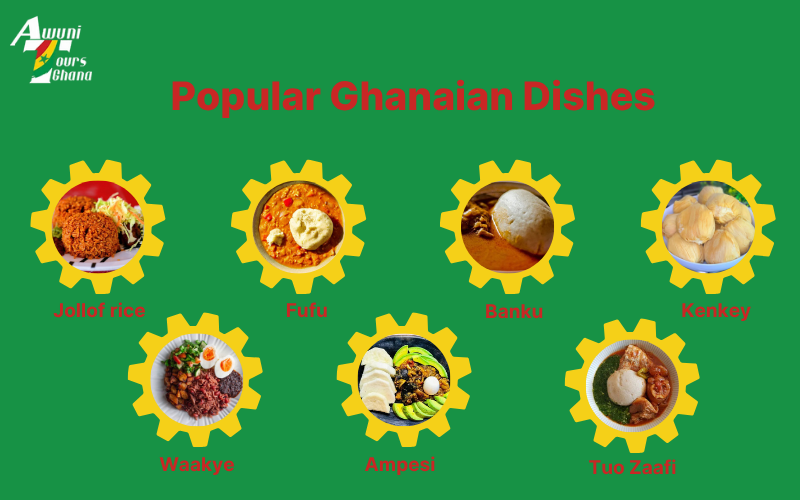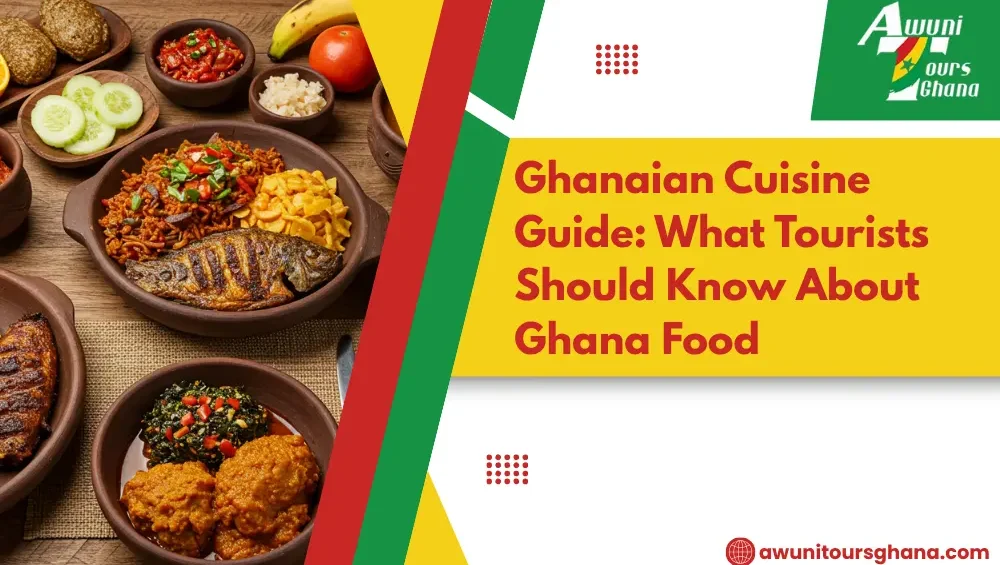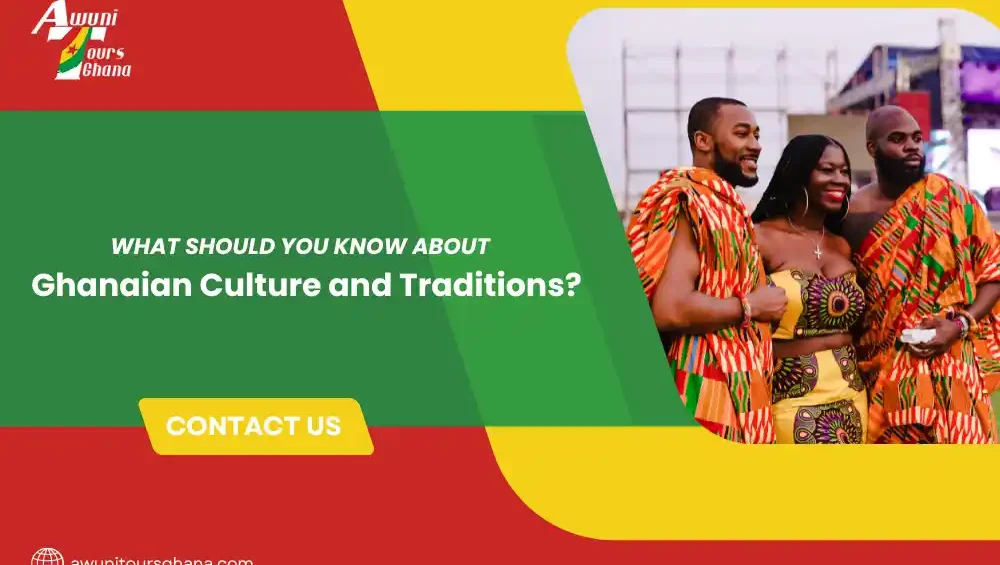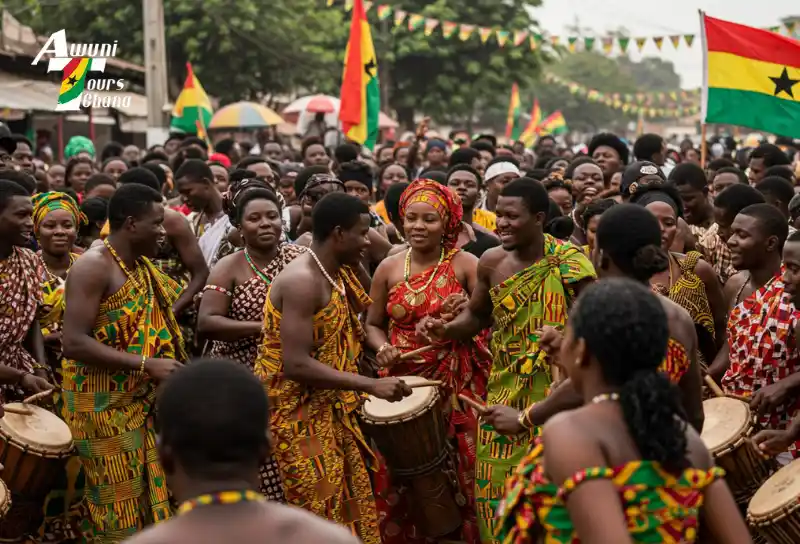Ghanaian Cuisine Guide: What Tourists Should Know About Ghana Food
Ghanaian cuisine is more than just food it’s a window into the country’s culture, hospitality, and traditions. As a tourist visiting Ghana, understanding what do people from Ghana eat, how, and where people eat will make your experience richer and more meaningful. From spicy stews to fermented doughs, from street snacks to tropical drinks, Ghanaian food is diverse, delicious, and worth exploring.
This Ghanaian Cuisine Guide will walk you through the essential foods, customs, and culinary experiences to know before your journey begins.
Ghanaian Cuisine Guide: Top Things Tourists Should Know About Ghanaian Food
Food is a big part of daily life in Ghana, and understanding it adds a whole new layer to your trip. This Ghanaian Cuisine Guide highlights what tourists should know about local dishes, ingredients, and how meals are enjoyed across the country.
1. Ghanaian Cuisine Is Based on Local, Seasonal Ingredients
Traditional Ghanaian food is built around fresh, locally grown ingredients. Staples like cassava, maize, plantains, yams, and rice form the base of many dishes. Protein sources range from fish (especially in coastal areas) to goat, beef, chicken, snails, and beans. You’ll also see plenty of vegetables like tomatoes, garden eggs (local eggplant), okra, and cocoyam leaves.

Spices and seasoning are central expect bold flavours from ginger, garlic, onion, chili, and local spice blends.
2. Meals Often Include a Starch + Soup or Stew
Most typical food of Ghana consists of a starch (like fufu, banku, rice, or kenkey) served with a rich soup or stew. These combinations vary by region and are often eaten by hand using the right hand only.
Popular pairings include:
- Fufu with groundnut soup
- Banku with okra stew or grilled tilapia
- Kenkey with fried fish and shito
- Jollof rice with chicken or goat stew

3. Popular Ghanaian Dishes You Should Try
Here are some of the most common and beloved dishes in Ghana:

Jollof Rice
Spiced tomato rice, usually served with grilled meat or fish. Every household has their own version.
Fufu
Made by pounding boiled cassava, yam, or plantain into a smooth dough. Served with soups like light soup, palm nut soup, or abenkwan (palm oil-based).
Banku
A sour dough ball made from fermented corn and cassava. Eaten with pepper sauce and tilapia or okra stew.
Kenkey
Similar to banku but wrapped in corn husks and steamed. Pairs well with fried fish and spicy condiments.
Waakye
A hearty rice-and-bean dish, typically served with boiled eggs, spaghetti, gari, stew, and sometimes meat or fish.
Ampesi
Boiled yam or plantain, served with palava sauce made from cocoyam leaves and often egusi (melon seeds).
Tuo Zaafi
A soft maize dish from Northern Ghana, served with green soup made from ayoyo or okra.
4. Street Food Culture Is Big in Ghana
Ghana street food is a major part of daily life. It’s affordable, tasty, and everywhere from major cities like Accra and Kumasi to small towns.

Look out for:
- Kelewele – Spiced fried plantains
- Bofrot – Sweet fried dough balls
- Chinchinga – Grilled meat skewers
- Roasted corn and coconut
- Fried yam and fish
- Meat pies – Pastries filled with minced meat
- Agbeli Kaklo – Fried cassava balls
You’ll find these in night markets, roadside stalls, or sold by vendors during traffic stops.
5. Ghana Has Regional Food Differences
Different parts of Ghana have unique culinary traditions. As you travel, try these regional specialties:
Northern Ghana
- Tuo Zaafi and Tubani (steamed bean cakes)
- Millet-based porridges like koko and pito
Volta Region
- Akple (cornmeal dough) with fetri detsi (okra or tomato-based soup)
Ashanti Region
- Fufu with abunuabunu (a green soup made from kontomire and snails)
Coastal Regions
- Seafood-based dishes like etor (mashed yam with palm oil and eggs) and octopus stew
Exploring food by region offers an authentic look at Ghana’s cultural diversity.
6. Local Drinks and Tropical Fruits Are Part of the Experience
Ghana’s tropical climate means fresh fruit and natural beverages are always in season. They’re often served with meals or as standalone refreshments.

Popular Drinks:
- Sobolo – Made from hibiscus petals, ginger, and cloves
- Palm Wine – Slightly alcoholic sap from palm trees
- Pito – Millet-based beer, usually homemade
- Lamugin – A sweet, spicy drink made with rice and ginger
- Brukina – A thick drink made from millet and milk
- Coconut water – Sold fresh on the roadside
Local Fruits:
- Mangoes, papayas, pineapples, bananas, avocados
- Watermelons, guavas, and African star apples (alasa)
7. Dining Customs and Etiquette
Eating in Ghana is often communal, warm, and respectful. Keep these cultural norms in mind:
- Use your right hand when eating or receiving food. The left hand is considered impolite.
- Handwashing before meals is customary, especially when eating without utensils.
- Food is shared—sometimes from a communal bowl, especially in family settings.
- Ghanaians are hospitable—if you’re invited to eat, it’s polite to accept or try a little.
- Meals may be spicy—ask for less pepper if you’re sensitive to heat.
8. Where Tourists Can Try Ghanaian Food
You don’t need to visit a fancy restaurant to enjoy Ghanaian cuisine. In fact, some of the best Ghana African food is found in:
- Chop bars – Casual local eateries
- Roadside stalls – Especially for snacks and street food
- Home-cooked meals – If you’re lucky enough to be invited
- Modern restaurants – Especially in Accra, with menus for all tastes
Ask locals for recommendations—they’re usually more than happy to point you toward their favourite food joints.
From spicy stews to fermented doughs, from street snacks to tropical drinks, Ghanaian food is diverse, delicious, and worth exploring. If you want to experience it firsthand, check out our Ghanaian food tasting tour for a guided culinary adventure.
Conclusion
Ghanaian cuisine is diverse, flavour-packed, and deeply rooted in the country’s history and culture. As a tourist, exploring the food is one of the best ways to connect with local people, customs, and traditions.
So don’t hold back—try the fufu, sip the sobolo, and sample the kelewele. Whether you’re at a street stall or a family table, Ghanaian food offers warmth, flavour, and memories you’ll never forget.
FAQs
Who serves the best Ghana street food in Accra?
Some of the best Ghana street food in Accra can be found at Osu Night Market, Madina Market, and Kaneshie Market, as well as from roadside vendors near busy intersections.
What spices are used in Ghanaian food?
Common spices include ginger, garlic, chili pepper, onions, anise seed, nutmeg, and local spice blends like suya and dawadawa.
What makes Ghanaian street food unique?
It’s freshly prepared, widely available, inexpensive, and deeply tied to local culture. Dishes like kelewele, chinchinga, and bofrot are everyday favourites.
Why do Ghanaians eat with their hands?
Eating with the right hand is a cultural norm in Ghana, especially for traditional dishes like fufu. It creates a more tactile, communal dining experience.














